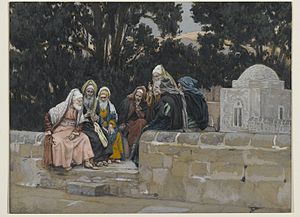Earlier this summer while listening to a course from The Teaching Company, Bart Ehrman’s How Jesus Became God, something struck me that I’d missed earlier. He alluded to the notion that the Apostle Paul, as a Pharisee, had an apocalyptic worldview even before he came to believe that Jesus was the Christ. That notion, I confess, came as a bit of a surprise to me.
He repeats this belief in his most recent book, The Triumph of Christianity: How a Forbidden Religion Swept the World, this time even more clearly and confidently. As proof, he reminds us that Paul called himself a Pharisee. Ehrman writes:
Like many other Jews of the time—including such figures as John the Baptist and Jesus of Nazareth—Pharisees held to a kind of apocalyptic worldview that had developed toward the very end of the biblical period and down into the first century.
Ehrman, Bart D.. The Triumph of Christianity: How a Forbidden Religion Swept the World (p. 44). Simon & Schuster. Kindle Edition.
As I indicated above, this notion struck me as a bit odd. First, if you’ve read anything at all about the Pharisees, you know that we have limited information about who they were and what they actually believed. The three main sources for first-century Pharisaism — the later records of Rabbis reflecting on earlier times, the writings of Josephus, and the gospels of the New Testament — all have a particular point of view and an axe to grind. In the end, we are certain of very little.
The small amount we do know requires a great deal of careful analysis and sober judgment. Too often what we thought we knew was simply the result of overconfidence and an uncritical approach to the meagre (and contradictory) sources at hand. Jacob Neusner, author From Politics to Piety: The Emergence of Pharisaic Judaism, put it this way:
While every history of ancient Judaism and Christianity gives a detailed picture of the Pharisees, none systematically and critically analyzes the traits and tendencies of the discrete sources combined to form such an account. Consequently, we have many theories but few facts, sophisticated theologies but uncritical, naive histories of Pharisaism which yield heated arguments unillumined by disciplined, reasoned understanding. Progress in the study of the growth of Pharisaic Judaism before 70 A.D. will depend upon accumulation of detailed knowledge and a determined effort to cease theorizing about the age. We must honestly attempt to understand not only what was going on in the first century, but also — and most crucially — how and whether we know anything at all about what was going on. “Theories and arguments should follow in the wake of laborious study, not guide it in their determining ways, however alluring these may look among the thickets and brush that cover the ground.” (Neusner 1972, p. xix)
The quotation at the end comes from G.R. Elton’s review of Fussner’s Tudor History and the Historians from the journal History and Theory.
Scholars who specialize in the history of the Pharisees have been arguing for decades over who they were, when they first appeared, what they believed, and even what their name means. Did it really mean “separatist”? If so, what were they separating from?
In Steve Mason’s 2001 tome, Flavius Josephus on the Pharisees: A Composition-Critical Study, he provides a useful list of scholars for and against various issues in Pharisaic history (see p. 2). For anyone interested, I will reprint it here with expanded details. Where possible, the links below will take you to the actual online text of the publication.
First, on the overall question of core, common beliefs, Mason lists one as “the repudiation of apocalyptic,” an element found in Kurt Schubert’s “Jewish Religious Parties and Sects”, in The Crucible of Christianity, ed. Arnold Toynbee [London: Thames and Hudson, 1969], 89). Continue reading “Was Paul an Apocalyptic Jew Before His Conversion?”




